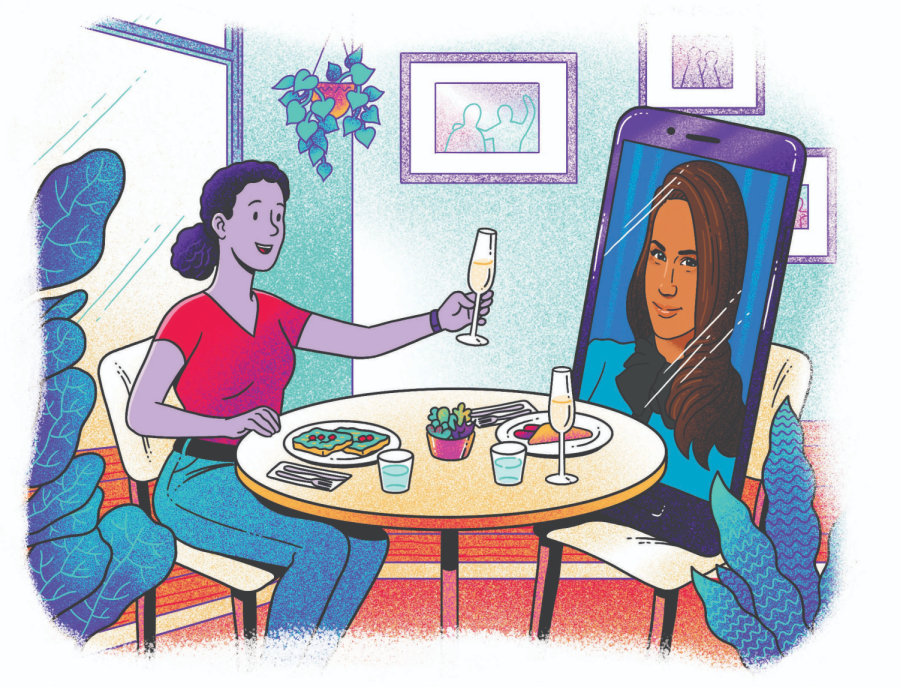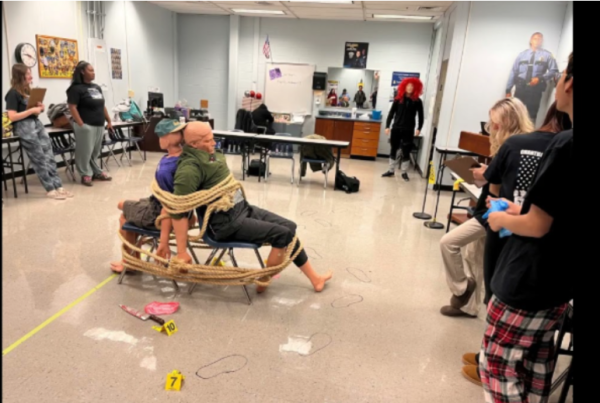MY GIRLFRIEND DOESN’T KNOW WHO I AM: PARASOCIAL RELATIONSHIPS
Photo courtesy of Chicago Parent
Visual representation of a parasocial relationship between a public figure and viewer.
A picture perfect date night–filled with love and laughter–all in the comfort of your own bed. Your partner’s presence is so glorious that it has a glow, burning into your eyes. Your heart races at just the thought of them being near. With a smile on your face, you send another Tweet to your lover: @TaylorSwift, have my babies!!!! i love u so much more than any of ur boyfriends ever could!
The term “parasocial relationship” was coined in 1956 by two Yale professors: Horton and Wohl. It is a one-sided relationship between a personality and a spectator. This connection is present in our everyday lives, whether it’s with Taylor Swift and her Swifties or an anime character and unemployed 30-year-olds in their moms’ basements.
According to psychologists John Maltby and David C. Giles, parasocial relationships can be classified under three levels: entertainment-social, participating in light-hearted gossip from sources like tabloids and the paparazzi; intense-personal, having strong, compelling emotions towards a figure and having an acute sense of empathy for them; and borderline-pathological, having vivid fantasies of a person and genuinely believing that a personal relationship with them exists.
Most people classify under the first two levels, becoming attached to a person/character and their lives. For example, although pointless in their real lives, the romantic affairs of public figures appeal to many people for a variety of trivial reasons (for more on this, see Carmen Cisneros-Cossio’s article on celebrity romance). However, in some cases, one could reach the point of the third level and begin to have uncontrollable, disturbing behaviors towards the person on the receiving end of the parasocial relationship (most often, celebrities). One of the most infamous instances of this level resulted in the death of the beloved up and coming artist, Christina Grimmie. In June of 2016, Kevin James Loibl shot Grimmie three times at a post-concert meet and greet, Grimmie died an hour later. According to Cory Dennington, Loibl’s friend of 15 years, Loibl referred to Grimmie as his “soulmate,” and believed that he could share a relationship with her. When Dennington commented on this flawed thinking, Loibl would become defensive and hostile.
There is an unpredictable pipeline from parasocial relationships to inherent danger, and it must be recognized by both viewers and entertainers. Although viewers in these relationships must practice responsible behavior, celebrities should also be mindful of what facilitates a risky connection.
In Korean pop music (K-pop), parasocial relationships play an integral role in attracting new fans and keeping old fans entertained. Through social media, live streams, “fan-meets,” and behind-the-scenes footage, K-pop fans often grow to feel connected with their favorite celebrities, and even grow to love them. Aware of the importance of this phenomenon to business, Korean record label companies make sure that these celebrities maintain a squeaky clean reputation, regularly interact with fans directly, and stay out of dating scandals. A popular example of what happens when a favorite celebrity breaks one of these rules is the downfall of Jongdae Kim(stagename Chen) of EXO.
EXO, a beloved K-pop group, is one of many groups that profit off of parasocial relationships. In 2020, Jongdae Kim, a talented vocalist of the group, issued a heartwarming statement announcing his engagement and his fiancée’s pregnancy. Thousands sent death threats to Kim and his fiancée, shamed him with various insults, and demanded his permanent removal from EXO. The main justifications for this harassment was that he was irresponsible for having premarital intercourse and he was “disloyal” to fans. It’s obvious that Kim has no obligation towards strangers, and he can choose to live the way he wants. However, the reason why fans reacted to his announcement the way they did should be analyzed and serve as a warning for the further use of parasocial relationships to propel fame. By being free of any romantic relationships, K-pop idols appear to be attainable in fans’ eyes, thus creating a deeper parasocial relationship that will in turn boost sales. Evidently, fans of Jongdae Kim who carried the misconception that they “owned” Kim were the ones who were the most outraged.
Contrary to popular belief, parasocial relationships are not inherently harmful; in addition to generally being psychologically healthy, they are also normal in humans. According to a research study from Thriveworks, approximately 51% of Americans have been in a parasocial relationship, although only 16% admit the fact. These connections often enable empathy for others and the growth of feelings such as inspiration and creativity, and they play big roles in many people’s lives. The majority of unhealthy parasocial relationships escalate to a dangerous point as a result of the absence of medical intervention. The death of Christina Grimmie begs the question of whether it could have been prevented if Kevin Loibl sought help. By actively noticing warning signs such as Loibl’s concerning comments about Grimmie and taking action, you can help avert a similar tragedy.
Whether it be with a fictional character or movie star, we are allowed to have strong feelings of affection and love. Nonetheless, we should think twice before indulging in interactions with people who don’t even know who we are. After all, you probably don’t know them as well as you think you do.

My name’s Alyssa and I enjoy writing about music and movies. I hope to express my interests thoroughly through the Watchdog!







